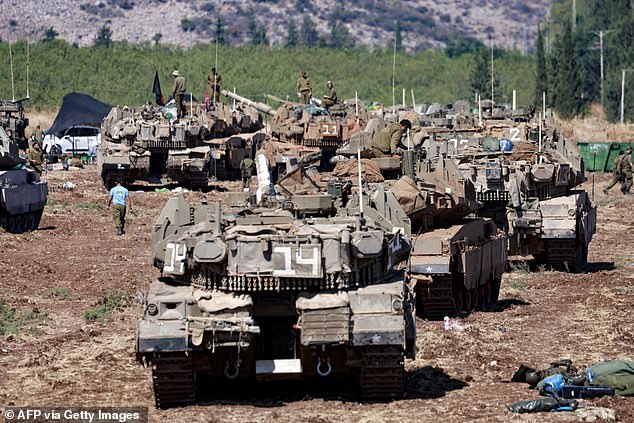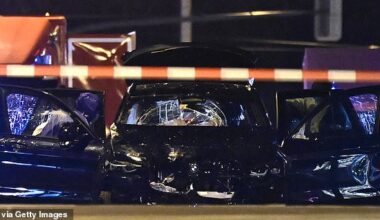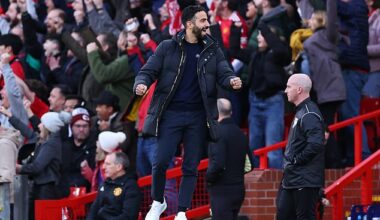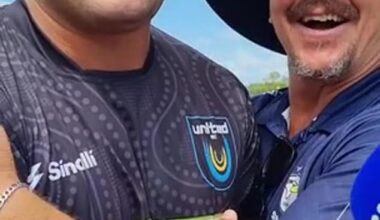Hundreds of Israeli tanks have lined up along the Lebanon border as fears grow over an anticipated ground invasion that could plunge the Middle East into an all-out war.
It came as Israel also launched a fresh wave of airstrikes against Houthi targets in Yemen on Sunday amid fears that the raging conflict could spill out across the region.
The Israel-Hamas war has escalated in recent days after the IDF said it had wiped out Hezbollah’s top brass in the airstrike on southern Beirut that killed the group’s leader, Hassan Nasrallah.
Israeli troops and tanks were last night seen gathering in the north, on their border with southern Lebanon, in apparent preparation for a ground invasion.
The last time Israel launched a ground offensive of Lebanon was in 2006, when 34 days of intense cross-border fighting with Hezbollah ended in a stalemate.
The United States has issued an 11th-hour appeal to both sides for restraint, with US president Joe Biden warning Israeli Prime Minister Benjamin Netanyahu that an all-out war in the Middle East must be avoided.

Hundreds of Israeli tanks have lined up at the Lebanon border, with a ground invasion looming

Tensions are escalating after Israel said it had wiped out Hezbollah’s top brass in the airstrike on southern Beirut that killed the group’s leader, Hassan Nasrallah

It came as Israel also launched a fresh wave of airstrikes against Houthi targets in Yemen (pictured) on Sunday

Firefighters attempt to extinguish the fire at a power plant following Israeli airstrikes on Hodeidah city, Yemen, on September 29
Israel claimed that more than 20 senior Hezbollah members including Ali Karaki – who was in charge of the southern front – were assassinated in the attack on Friday alongside Nasrallah.
Reuters reported Nasrallah’s body was found yesterday, and videos circulating on social media purport to show his body being retrieved.
Hezbollah – the Iran-backed terror group in Lebanon – confirmed that Nasrallah, who led it for 32 years, was killed in Friday’s strike. Hashem Safieddine is expected to take over as the leader.
Several foreign embassies have now begun to evacuate non-essential staff as the country braces for the possibility of an all-out war.
Continued airstrikes in Lebanon killed at least 100 people on Sunday, according to the Lebanese health ministry.
Workers at the marina told the Mail that staff from the Saudi Arabia embassy had departed from Lebanon by boat on Saturday evening. It was unclear whether the ambassador was among the group.
Last night Israel’s defence minister, Yoav Gallant, said: ‘Our message is clear – for us, no place is too far.’
Yesterday dozens of Israeli warplanes bombarded several Houthi targets in Yemen, according to Israel’s military spokesman.
They destroyed power plants and the nearby Ras Isa port which the IDF claims is used by the terror group to transfer ‘Iranian weapons to the region’.
The Al-Mayadeen network reported more than ten airstrikes were carried out on oil tankers in the area as revenge for missile attacks which had been fired into Israel by the Houthi Rebels.

Hundreds of Israeli tanks have been deployed in the Upper Galilee region of northern Israel

Soldiers were seen making last-minute preparations as a ground invasion of Lebanon looms

Two Israeli soldiers are seen running towards their tanks at the northern border withLebanon

An Israeli tank is transported to a position in the Upper Galilee region of northern Israel near the border with Lebanon

Firefighters search for survivors inside an apartment building hit by an Israeli air strike in Beirut’s Cola district
Yemen’s Houthis have repeatedly fired missiles and drones at Israel since October 7 in what they say are solidarity attacks for Palestine.
They have also hijacked commercial ships in the Red sea including British vessels.
Israeli forces also said they struck Hezbollah targets across Lebanon.
A civil defence worker who survived a ‘precise strike’ in Dahiyeh, southern Beirut, said he received a last-minute warning shortly before a missile hit a neighbouring building.
Speaking to our reporter, he said: ‘I barely made it. I got a message to evacuate and four minutes later there was a strike’.
Yesterday Pope Francis said that the airstrikes in Lebanon go ‘beyond morality’. It comes as British families fled to Beirut airport, with the Government last night once again urging British nationals to leave Lebanon.
Iran has vowed revenge for the death of an Iranian general killed alongside Nasrallah on Friday. Abbas Araghchi, Iranian foreign minister, said the killing of Brigadier General Abbas Nilforoushan ‘will not go unanswered’.
A ‘barrage of rockets’ was launched at northern Israel yesterday afternoon causing red alert sirens to ring out in the Tiberias region.
Since October last year Hezbollah has been firing thousands of missiles at Israeli towns and villages which has led to the semi-permanent displacement of more than 60,000 people.

Local residents and civil defense teams conduct search and rescue efforts in the rubble of the building destroyed in an Israeli army attack on the village of Ain Ed Delb, located west of the city of Saida, Lebanon, on September 29

Nasrallah, seen addressing supporters in Lebanon’s capital Beirut in November 2013, was killed by an Israeli air strike on the city on Friday

The Israeli military also announced it had killed another high-ranking Hezbollah official in an air strike – Nabil Kaouk (pictured), the deputy head of Hezbollah’s central council

A picture reportedly of Ali Karaki, the head of the terror group’s Southern Front, circulated on social media after the IDF confirmed he had been killed in Friday’s airstrike
Tragically 12 children were killed in July by a Hezbollah rocket fired from Lebanon which exploded on a football field in Israel.
Up to one million Lebanese people have now also been displaced from their homes as a result of the fighting, according to Najid Mikati, the Lebanese prime minister.
Netanyahu has vowed to return the 60,000 displaced Israeli citizens to their homes along the Lebanese border.
IDF tanks continue to gather on the country’s northern border in preparation for a possible incursion into southern Lebanon.
This week, Herzi Halevi, Israel’s chief of the general staff, told troops that the fierce aerial bombardment was to ‘prepare the ground for your possible entry’.
And on Wednesday Yoav Gallant oversaw a rehearsal of an incursion, telling soldiers: ‘The moment may come when we give an order.’
The last time Israel launched a ground invasion of Lebanon was in 2006, when Hezbollah fired rockets at Israeli border towns.
However, the Shia militia has faced almost two weeks of intense bombing that has obliterated Lebanese towns along the border.
‘We let them build up again on our border after 2006 and that was a mistake’, 39-year-old Yuval, a British citizen and reservist infantryman, whose parents moved to Israel in the 1970s, told The Times.
Yuval, who has spent four months fighting with the IDF in Gaza, added: ‘Now there’s not a chance in hell we’ll let them sit on our border. I understand the world doesn’t like conflict. But whether it’s with airstrikes or a ground invasion, we need to move them.’
He added: ‘The soldiers are ready, the tanks are ready. We know they are waiting for us … I’m tired, but we’re here because it’s important.’
Energised by the death of Hezbollah’s leader, 28-year-old reservist engineer Yehuda told the newspaper: ‘We must do what we must do.’
As Israel launch attacks on Lebanon and Yemen, the Houthi-run health ministry said at least four people were killed and 29 wounded in airstrikes on Yemen’s port of Hodeidah, which Israel said were a response to Houthi missile attacks.
In Lebanon, authorities said at least 105 people had been killed by Israeli air strikes on Sunday.
On Monday, an Israeli air airstrike hit an upper floor of an apartment building in the Kola district of Beirut, with firefighters seen tackling a blaze.
Lebanon’s Health Ministry has said more than 1,000 Lebanese have been killed and 6,000 wounded in the past two weeks, without saying how many were civilians. The government said a million people – a fifth of the population – have fled their homes.
Israeli drones hovered over Beirut for much of Sunday, with the loud blasts of new airstrikes echoing around the Lebanese capital.
Displaced families spent the night on benches at Zaitunay Bay, a string of restaurants and cafes on Beirut’s waterfront.
Many of Israel’s attacks have been carried out in the south of Lebanon, where the Iran-backed Hezbollah has most of its operations, or Beirut’s southern suburbs.
The United States has urged a diplomatic resolution to the conflict in Lebanon but has also authorised its military to reinforce in the region.
President Joe Biden, asked if an all-out war in the Middle East could be avoided, said ‘It has to be.’ He said he will be talking to Israeli Prime Minister Benjamin Netanyahu.
Meanwhile John Kirby, the White House national security spokesman, warned Netanyahu that he risked a wider regional war by sending his soldiers into Lebanon.
‘An all-out war with Hezbollah, certainly with Iran, is not the way to do that. If you want to get those folks back home safely and sustainably, we believe that a diplomatic path is the right course,’ he told CNN.
Following the assassination of Nasrallah, Safieddine is expected to take over as the leader of Hezbollah.
Safieddine, his maternal cousin, is also a cleric who wears the black turban denoting descent from Islam’s Prophet Mohammed, and has long been tipped as his successor.
It’s believed he was born in southern Lebanon and is in his late 50s or early 60s. As young men they studied theology together at Shia institutions in Iraq and Iran.
Safieddine joined Hezbollah soon after it was set up during the Lebanese civil war – after Israel besieged the capital Beirut in 1982.
He heads Hezbollah’s political affairs and is a member of the Jihad Council, which manages the group’s military operations. The US and Saudi Arabia class Safieddine as a terrorist.
He made headlines in the wake of Hamas’ attack on Israel on October 7, 2023, when he confirmed Hezbollah’s support for the group. ‘Our history and guns and our rockets are with you,’ Safieddine said.
Fears of a ground invasion came as Syrians and Iranians celebrated following Nasrallah’s death in Lebanon’s capital Beirut on Friday.
There were jubilant scenes in the northern Syrian city of Idlib, where people took to the streets honking horns, handing out sweets and thanking Israelis.

Iranian demonstrators have been celebrating outside the Israeli embassy in Kensington, west London, the death of Hezbollah leader Hassan Nasrallah

There were also jubilant scenes on the streets of the northern Syrian city of Idlib, which is held by rebels against the country’s president Bashar al-Assad who has been helped by Hezbollah
Anti-Iranian regime demonstrators also gathered outside the Israeli embassy in Kensington, west London, to welcome Nasrallah’s assassination.
In contrast to the scenes of joy outside the Israeli embassy in London, Iran’s embassy to the UK in the capital has lowered its flag to half-mast following Nasrallah’s death.
The move came as Iran began five days of official national mourning, announced by the country’s Supreme Leader Ayatollah Khamenei.
Kaouk had been thought to be among the main contenders to replace Nasrallah, who had led Hezbollah for 32 years.
The Lebanese group’s role supporting both the Iranian and Syrian ruling regimes helps explain why many opponents of both have welcomed Nasrallah’s demise.
Iran helped establish Hezbollah in the 1980s and has provided the Lebanese militant group with sophisticated weaponry and training.
Hezbollah has also aided Syria‘s President Bashir al-Assad in his crackdown on rebels in that country’s civil war which has been raging since 2011.
Syria’s government condemned Nasrallah’s killing in Friday’s strikes, in contrast to the jubilant response in rebel-held Idlib where people waved Syrian flags, cheered and handed out treats.
One person wrote on X, formerly Twitter: ‘I’m in Idlib right now and the Syrians are out on the streets celebrating rumours of the death of Nasrallah, the leader of Hezbollah, aka Hezboshaytan!
‘Just a few days ago Hezboshaytan bombed a village here, today we buried a one-year-old baby and his mother that were killed.’
Another video posted on social media showed women in Iran, covering their faces, welcoming the news of Nasrallah’s death.
A speaker said: ‘The children of Iran send a congratulatory message to everyone for the death of Hassan Nasrallah and congratulate the Iranian nation.’
Source link






